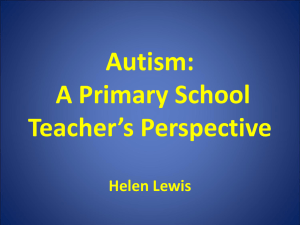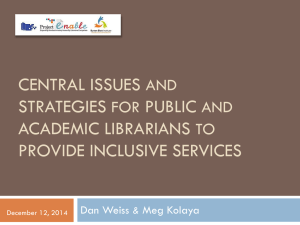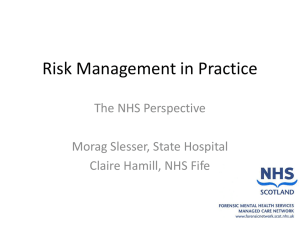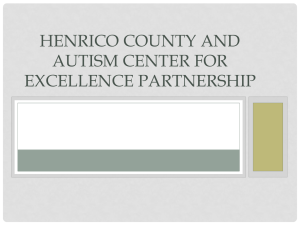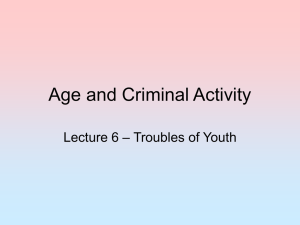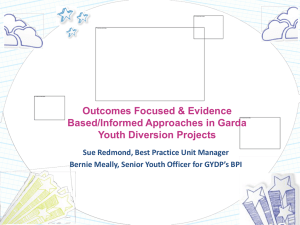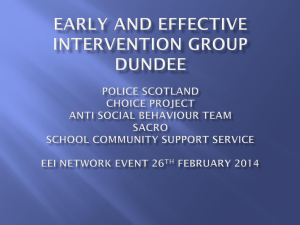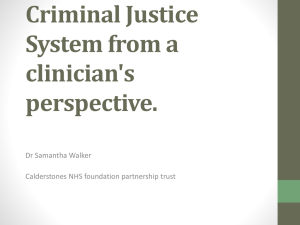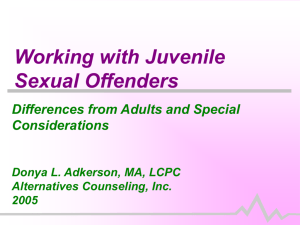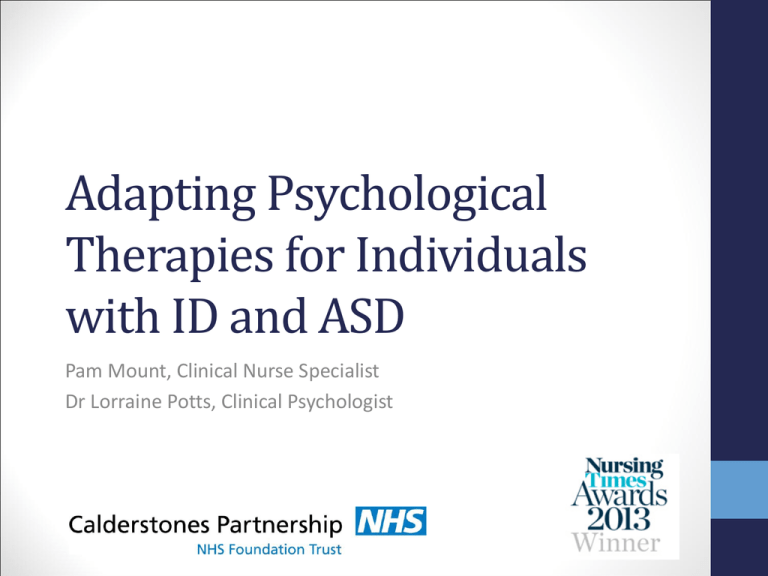
Adapting Psychological
Therapies for Individuals
with ID and ASD
Pam Mount, Clinical Nurse Specialist
Dr Lorraine Potts, Clinical Psychologist
Introduction…
Calderstones Partnership NHS Foundation Trust is a specialist learning
disability service.
The Trust is based in the Ribble Valley near the village of Whalley in Lancashire.
We provide a specialist service to men and women with a learning disability
and/or other developmental disorders, mental health problems, challenging
behaviours and offending behaviour including in-patient assessment and
treatment and community based services across the North West.
www.calderstones. nhs.uk
ASD at Calderstones
Reason for Admission
Female:
Aggression: 6
Breakdown of placement: 3
Male:
Aggression: 8
Breakdown of placement: 17
Sexual Offending: 7
Fire setting/arson: 3
Crimes of acquisition: 1
Imprisonment of others: 1
We identified a group of service users
to help us reflect on our practice. Our
criteria were as follows:
•
•
•
•
Intellectual disability
ASD diagnosis
Has sexually offended
Has engaged with psychological
treatment
AUTISTIC
SPECTRUM
DISORDER
TOOLKIT
Family and
Community Supportive
Relationships
Best Practice
Learning
ENGAGE
ASSESS
FORMULATE
REVIEW
FUNCTION AND
SOCIAL
PARTICIPATION
Resources / Policies
/ Environment
KEEPING
PEOPLE
SAFE
Whilst we reflected on the aspects of our practice that were
different as a result of the individuals ASD, we also felt it was
important to allow our service users to speak for themselves.
3 of our service users kindly offered to contribute to today's
presentation and we have therefore included audio clips and
some drawn material as we work our way through these slides.
Our first realisation:Responses to therapy and the
adaptations that we make are very
different according to each service
users individual needs.
Each service user had strengths we
could draw upon and differences or
weaknesses which needed to be
addressed.
Engage
Assess Formulate
Treatment
Review
Engage
The development of a ‘safe enough’ therapeutic relationship is key.
This can take + + time.
Some of the engagement styles we have come across:
Socially acceptable
response
The ‘Perfect
patient’
Answers all
questions openly
and honestly –
over inclusive
Too much detail?
Fixed story
Inflexible, unable
to shift / evaluate /
reflect
Assess
The following are some of the standard assessments we use for individuals
who have sexually offended:
•
•
•
•
•
•
Questions on Attitudes Consistent with Sexual Offenders (QACSO)
Sexual Offender Self Appraisal Scale (SOSAS)
University of Rhode Island Change Assessment (URICA)
Adapted Relapse Prevention interview (ARP)
Risk of Sexual Violence Protocol (RSVP)
Assessment of Risk and Manageability in Intellectually Disabled Offenders
(ARMIDILLO)
However, for individuals with an ASD we also need:
•
•
•
A good description of the individuals autism and
how it affects them incl. social understanding,
emotions and ToM
A good description of the individuals strengths and
weaknesses
A good description of the individuals cognitive style
Assess
Then it dawned
on me he chose
everyone with
blonde hair
Specific issues which require consideration when
using assessment tools:
•
•
•
•
•
•
•
•
Open / closed questions
Concrete responses to psychometric questions
Need for reflection / insight
Understanding of emotional terminology / concepts
Information processing style
Understanding others perspectives
Misinterpretation of abstract words / concepts
One word – 2 meanings e.g. new as in recent or not
been seen before
For example: (QACSO – Questionnaire on Attitudes Consistent
with Sex Offences)
• Do some women like men to stare at their
(ToM)
bodies?
• If a girl invites you back to her place for a (Social situation)
coffee is she really offering to have sex?
• Do you think that it would take a woman
(Emotions)
years or a few days to get over being flashed at?
Formulation
Formulation is the process of making sense of a person’s
difficulties in the context of their relationships, social
circumstances, life events, and the sense that they have
made of them.
It is a bit like a personal story or narrative that a
psychologist or other professional draws up with an
individual and, in some cases, their family and carers.
Formulation
A good formulation:
•
•
•
•
•
•
Is specific to the individual
Is comprehensive
Has good face validity
Reflects theory and evidence base
Is shared by all
Identifies treatment pathways
Formulation
Offending behaviour:
Indecent Assault
Offence:
Touching a stranger in a sexual manner
Grooming
Sensory need
Fascination with
‘blonde hair’
Poor social skills
Fetish
Emotional
Congruence
Power /
dominance
Inability to start
a conversation
Fear / threat
Treatment decisions are made on the basis of the assessment and
formulation:
ASD Primary Focus
• Developing practical skills to make offending less likely
• Impact of their own offending on themselves – unpleasant
consequences
• External controls
• Rule based
• Visual support tools
Offending Primary Focus – CBT approach
• Group vs. individual therapy?
• Offence account
• Victim awareness
• Good lives model
• Self monitoring and staff observations
• Risk assessment
FORMULATION
Treatment
ASD specific differences that we regularly come across:
• Issues with Self Identity
• Detached emotional style
• Lack of theory of mind - empathy
• Pre occupations / Special Interests
• Social impairment
• Sensory needs
• Ability to internalise new rules and cognitive inflexibility
• Central coherence – seeing detail rather than context
• Anxiety
• Communication difficulties
Treatment: Self identity
‘GANGSTER’
‘PSYCHOLOGIST’
‘MODEL PATIENT’
‘Borrowed’ from:
• Films
• Life experiences
• Other patients
• Professionals
• Family
• Culture
He’s like a sponge
in the environment
he soaks up bits of
everyone
‘MODEL PAEDOPHILE’
• Good Lives Model of offending
• Using ‘New me Old me’ to create the
non offending self
Treatment: ToM
Victim Empathy: defined as the capacity to express
compassion for victims
Victim Awareness: motivators for change are not about the
victim/family and friends but about the perpetrators family
and friends
• Improving emotional recognition using role play and Makaton
pictures
• Increasing their understanding of the term victim in its wider
sense
• Exploring the impact of their offence upon themselves
• Drawing offence accounts
• Completing offence accounts
Treatment: Detached
emotional style
It can be very difficult to hear the offence accounts of
individuals who have an ASD.
•
•
•
•
•
Matter of fact
Cold
Emotional incongruence
All about them
No emotional connection to the content
in the room – leave you with it
He’s just ‘weirding’
me out
He told me
about his
offence like he
was reading
his shopping
list
It’s all about
what
happens to
him
Treatment: Sensory Issues
Example 1: This individual says he
doesn’t feel much. His only
‘sparkly’s’ arise when he’s drunk,
when he sees violence and when
he is sexually offending. The mere
presence of something sensory
flips him into a sexual place.
Example 2: A primary component
of this individuals offence was
smelling his hand after having
made contact with females.
How do I find a
legal ‘sparkly ‘
Example 3: 4 out of the 10
individuals we looked at for
this presentation had
sexualised behaviours
which were associated
with urine and faeces.
Review: What works?
•
•
•
•
•
•
•
•
•
•
Structure for those who are flexible
Sensory assessments
Visual aids
Social prompts
Role modelling and nurturing environments
Therapeutic communities – pros and cons
Group process
Aspiring to appropriate new identities
Negotiating with routines
Supporting anxiety management
Review: What about
when it doesn’t work?
Free time
Community
It can be hard to tease things apart.
Keep the individual in mind.
Bring the best knowledge from ASD practice and
the best knowledge from sexual offending practice.
It’s a process of working it out with the client and
with the team. Reviewing and refining.
Questions ?
Pam Mount is a Clinical Nurse Specialist (Learning
Disabilities) and CAT Practitioner who takes a lead on the
Calderstones Adapted Sex Offender Treatment
Programme. Pam promotes a person centred,
formulation based approach to understanding offending
behaviour in order to develop risk plans supportive of
the ‘Good Lives’ model.
Pam.mount@calderstones.nhs.uk
Dr Lorraine Potts is a Clinical Psychologist who has a
specialist interest in working with individuals on the autism
spectrum. Within this role, Lorraine undertakes ASD
diagnostic and functional assessment and works closely
with multi-disciplinary teams to develop clinical
formulations to guide intervention. Lorraine also
undertakes individual psychological therapy with
individuals who have autism and who have offended.
Lorraine.potts@calderstones.nhs.uk


